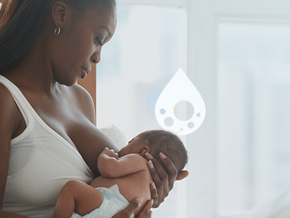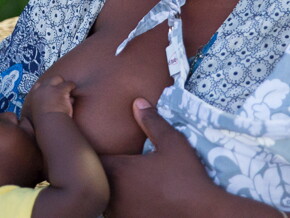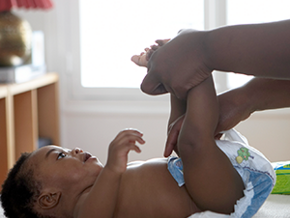
Expressing breast milk is an option to consider once you are comfortable with breastfeeding. Expressing and storing breast milk can offer many benefits to mothers including a few additional hours of uninterrupted sleep, alone or work time, or the ability to return to work while continuing to exclusively breastfeed your baby. You may even want to learn how to express breast milk to help relieve breast fullness prior to breastfeeding your baby or to use a small amount as a natural moisturizer for your nipples after a feeding. Expressing breast milk allows other family members to be involved in the feeding ritual. It's also easier than many think, and with practice can be performed quickly and easily, even by hand. Renting or buying a pump is also a convenient option. A healthcare professional can help you to choose an appropriate method.
Expressing breast milk: Step-by-step
To express milk by hand, simply follow these instructions:
- Wash your hands with soap and water.
- Sit or stand comfortably and place a clean wide-necked cup under your breast either in your lap or on the table.
- Massage your breasts with both hands.
- Place your thumb on top of your breast and first finger underneath the breast so that they are opposite each other on the edge of the areola (about 4 cm from the tip of the nipple) while supporting your breast with the rest of your hand.
- Push gently back towards your chest wall.
- Gently roll your fingers and thumb toward your nipple while applying slight pressure.
- Release the pressure and repeat this step. Get into a rhythm. If milk does not appear re-position your finger and thumb either closer or further from the nipple and try again, be patient.
- Switch hands to empty all areas of the breast.
- Switch breasts whenever the flow of milk slows down.
You may only get a few drops when first learning to express, but it will get better and easier with practice. Expressing breast milk can also be done using a manual or electric breast pump. Regular pumping will maintain your milk production, so should you want to continue to provide your baby with breast milk but are unavailable to breastfeed, you can still do so.
Storing breast milk
When storing breast milk, it is important that you seal the expressed milk in an airtight container and label it with the date and time. There are a number of ways that you can store breast milk:
- At room temperature for up to 6 hours.
- In the refrigerator for 3 days.
- In the freezer for about 3 months.
- In a chest freezer for about 6 months.
Breastfeeding support aids
Most mums plan to exclusively breastfeed right from the start. But for some mums, latching baby to the breast can be challenging. Your doctor or health care professional may discuss with you using breastfeeding support aids to help feed your newborn. Also known as lactation aids, breastfeeding support aids are short-term solutions, typically used for a few days, to help get both you and baby on track with successful breastfeeding at the breast.
Find breastfeeding help when you need it most
Most difficulties can be easily managed. You may simply need a few answers or a little guidance along the way. If you get support quickly, you'll be more likely to persevere with breastfeeding and be happy that you did. Some hospitals, community clinics or public health units also offer breastfeeding clinics to assist you in the community.
Click to learn more on the benefits of breastfeeding and breast milk















